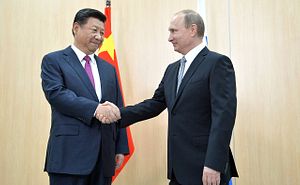Trans-Pacific View author Mercy Kuo regularly engages subject-matter experts, policy practitioners, and strategic thinkers across the globe for their diverse insights into U.S. Asia policy. This conversation with Tiberio Graziani – president of the Institute of Geopolitics and Applied Sciences in Rome and editor of GEOPOLITICA – is the 94th in “The Trans-Pacific View Insight Series.”
What is Moscow’s strategic calculus for Russia’s role in U.S.-China relations?
As far as the continental level is concerned, Moscow believes that a deep and long-lasting relationship between the two main Euro-Asian Powers, such as Russia and China, must be pursued for the geopolitical and geostrategic stability of the Eurasian continental mass. Russia and China have common interests in the Pacific and the Middle East areas. As far as the global framework is concerned, Moscow reckons Beijing as one of the main pillars for building a new multipolar or polycentric order. BRICS [Brazil, Russia, India, China, and South Africa] efforts are also part of this strategy.
Moscow does not seem intent on intruding into relations between Washington and Beijing, since it considers [U.S.-China ties] primarily economic and financial relations. However, Moscow is aware that China undermines U.S. hegemony in Asia Pacific and that there is a competition between Beijing and Washington in Latin America and Africa.
Describe the geostrategic stakes in managing North Korea from the perspective of Beijing, Washington, and Moscow.
In recent times, Beijing perceives North Korea as a regional disturbance factor that could jeopardize its win-win global strategy and provide the U.S. and Japan the pretext to justify any use of their armaments and logistical implementation in the Pacific area. Russia’s position over North Korea seems to be similar to the Chinese one. The U.S., increasingly projected in building an “America First” strategy, seems to be, at the moment, facing difficulty in making any decision to resolve the North Korean question.
The U.S. and Russia have long-standing interests in the Middle East while China is increasingly expanding its influence in the region. Explain the geopolitics of each country’s leadership in the Middle East.
Russian and Chinese interests in the Near and Middle East are complementary. Both countries have vital interests [requiring] that the whole strip starting from the Mediterranean and reaching Central Asia achieve stability as soon as possible. Their interests not only concern the level of security and, in general, the geostrategic landscape, but also significant energy-related and economic issues. China intends to maintain and implement good relations with all producers and energy holders of the area, also in view of the continental OBOR [One Belt One Road] project in which Beijing intends to invest its future. Russia aspires to play an active role in the Mediterranean and to balance the presence of the U.S. in the whole area and, at the same time, to build and improve the infrastructure for the transport of its energy resources in Europe.
The United States, a sea power with global aspirations, seeks to maintain its hegemonic role in the Mediterranean and Middle East areas both through the Atlantic Alliance and by consolidating relations and partnerships with its traditional allies such as Saudi Arabia, Israel, and the Emirates. However, according to President Trump’s latest statement during his trip in the Middle East, a new strategy seems to be emerging based on U.S. disengagement in favor of building of a kind Middle Eastern NATO.
Explain the impact of perceived Russian influence in U.S. domestic politics on U.S. global leadership.
I think that the presumed Russian influence on U.S. domestic politics corresponds to a fake target that President Trump’s current opponents shake to hide their mistakes during the electoral campaign rather than a real fact. However, the perception of this presumed influence and, above all, its dissemination could, on the one hand, contribute to Mr. Trump’s impeachment and, secondly, weaken, at global level, the perception of the solidity and strength that the United States has achieved in the world since the end of World War II.
Assess how U.S.-China-Russia relations might evolve under the U.S. administration’s “America First” policy.
It is difficult to evaluate the evolution of relations between the U.S., China, and Russia in the light of the “America First” doctrine, since the latter has no precise boundaries yet. In my view, President Trump is building, step by step, a foreign affairs doctrine that we will understand in a few months. For the time being, America First is still a slogan of his presidential campaign. Regarding President Trump, we are now accustomed to his sudden change of strategy. In my opinion, Trump is a tactician with great resilience, a considerable ability to adapt himself to the needs of the moment.
Washington seems intent to pursue a bilateral strategy with Russia and China articulated on single and specific aspects. At this time, a new global system seems to be emerging, but it will be very difficult to find a lasting balance. We are in the age of uncertainty.

































